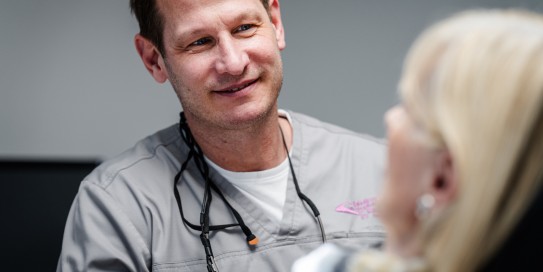
Nutrition and wound healing: how your diet can support healing
05.02.2025
Read here how you can support your body with the right diet.
The healing of wounds is a complex process that takes place in several phases: the inflammation phase, the formation phase and the remodeling phase. However, wounds can sometimes get “stuck” in the inflammation phase, which is often the case with chronic wounds. Such wound healing disorders are often caused by bacterial contamination or a lack of growth factors. The good news is that chronic wounds or wound healing disorders can be positively influenced by the right diet. This is because people with wounds have a higher calorie requirement than healthy people, which depends on factors such as age, fitness, body weight and the size of the wound. This also applies to wounds around your mouth. Let's take a closer look at which nutrients play an important role.
1. proteins - the building block of wound healing
Proteins are particularly important as they are needed for the immune response and the formation of new tissue. Even small wounds can lose a lot of proteins. It is therefore important to consume sufficient protein:
Recommendation for healthy people: about 0.8 g per kilogram of body weight.
For chronic wounds: between 1.25 g and 2.0 g per kilogram of body weight, depending on the size of the wound.
2. fats - energy for healing
Fats are an important source of energy for wound healing and support the formation of new cell membranes. Studies have shown that omega-3 fatty acids in particular, such as those contained in fish oil, can promote healing, especially in the case of surgical wounds in the head and neck area.
3. vitamins and trace elements - the helpers in the background
Vitamin A: Supports wound healing by promoting the formation of tissue. In short phases, doses of 10,000-25,000 IU per day can be useful.
Vitamin C: This antioxidant not only helps to heal wounds, but also protects cells from damage. A supplement of 500 mg to 2 g per day (spread throughout the day) is often recommended. Combinations: Studies show that vitamin C together with zinc and arginine can be particularly effective.
4. amino acids - important building blocks for healing
Arginine: This amino acid supports the formation of collagen and strengthens the immune system.
Glutamine: Particularly valuable as it accelerates the formation of new tissue and provides cells with energy.
Conclusion: Nutrition as the key to healing
A balanced diet rich in proteins, healthy fats, vitamins and amino acids can significantly support the healing of wounds. If important nutrients are missing, this can delay or even prevent healing.
Do you have any questions about proper nutrition during healing? Feel free to contact us - we will advise you individually!
Other articles that might interest you:
Anxiety-free visits to the dentist: treatments with empathy and trust
Find out here how we can guide you through your next appointment stress-free.Diabetes and periodontitis - an interaction with consequences
Around 10% of the population in Germany is affected by diabetes.
Praxisurlaub
Liebe Patienten:innen,
Unsere Praxis bleibt vom 25.08. bis zum 07.09.25 geschlossen.
Ab dem 08.09.25 sind wir wieder wie gewohnt für Sie da.
Bleiben Sie gesund!
Ihr Praxisteam



